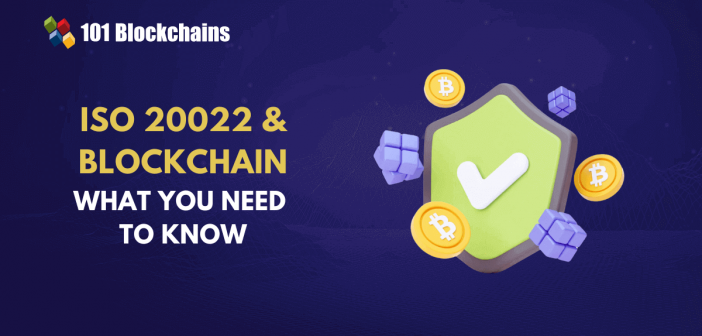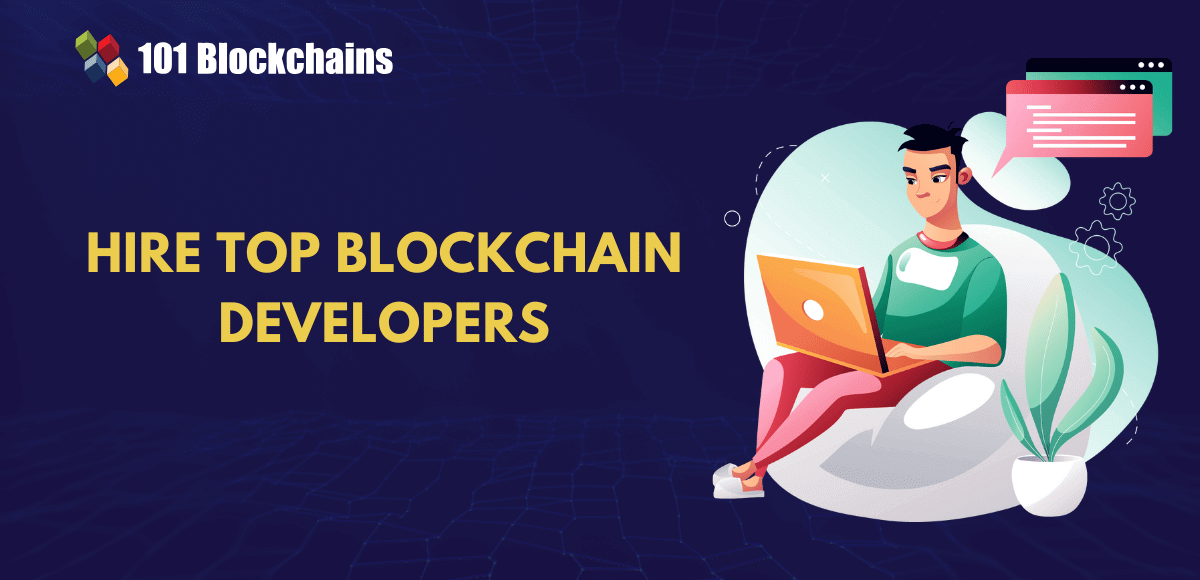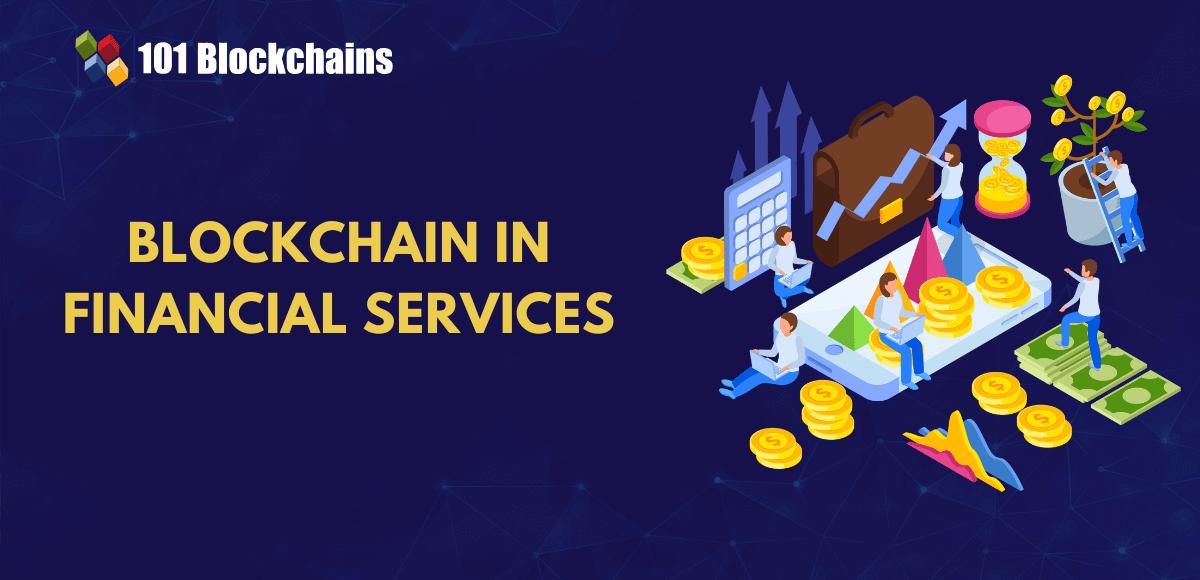Learn how blockchain truly works, master key definitions, and uncover what makes smart contracts so "smart." Dive into the fundamentals, gain valuable insights, and start your blockchain journey today!

- Blockchain
James Howell
- on July 15, 2025
What ISO 20022 Means for Blockchain and Payments?
ISO 20022 is the relevant standard for blockchain. However, ISO 20022 crypto has not yet been fully established. Currently, traditional financial environments dominate, and business applications often focus on utilizing blockchain technology for data exchange and workflow automation across industries. The ISO 20022 standard can also be applied to blockchain to develop solutions aligned with existing financial messaging protocols. This will drive blockchain’s widespread adoption, replace traditional banking credit practices, streamline cross-border transactions, and improve digital asset management.
Build your identity as a certified blockchain expert with 101 Blockchains’ Blockchain Certifications designed to provide enhanced career prospects.
Understanding ISO 20022
ISO 20022 is a modern standard that details the creation of messages for use in the financial services sector in a particular country or region. It replaces older financial system messaging standards like SWIFT MT messages. The standard encompasses multiple industries and businesses, such as payments, securities, credit cards, and foreign exchange. By adopting ISO 20022, financial institutions can achieve greater efficiency, reduce operational risks, and enhance the quality of data.
ISO 20022 supports messages with larger volumes of sensitive financial data, improving security and reducing transaction errors. This reduces discrepancies, speeds up balance checks, and increases tracking of transactions, which enhances efficiency in the world of finance.
What is the ISO for blockchain?
Although ISO 20022 crypto is primarily designed for traditional environments, its concepts can enhance blockchain technology by improving data exchange and interoperability. Integrating ISO 20022 with blockchain platforms enables the development of solutions aligned with existing financial messaging systems, increasing the acceptance of blockchain-based financial services.
Financial institutions worldwide are beginning to see benefits from ISO 20022-compliant blockchains. They can now comply with ISO standards, which allows less friction in international monetary transactions and ensures regulatory adherence and more effective payment processing in real-time.
ISO 20022 in Blockchain
Blockchain-based decentralized solutions are increasingly adopted in banking and finance due to their security, transparency, and efficiency. The decentralization of a distributed ledger as the main feature of the blockchain is supposed to lead to the transformation of system operations, namely, introduction of more safety, transparency, and efficiency. On the other hand, the consolidation of ISO 20022 to blockchain platforms can act as the “gateway”, which enables traditional finance systems and blockchain networks to communicate in a more standardized way, and thus easier.
Interoperability with blockchain improves as financial services seamlessly communicate with the infrastructure through blockchain-based applications, allowing institutions to adopt cryptocurrency assets without major technical barriers or regulatory pushback.
ISO 20022 adoption can enhance cross-border transactions. Financial message transmissions are very slow today and are often useless because they are incomplete. The standardization of messages under ISO 20022 eliminates the need for several middlemen, which is compatible with blockchain, making transactions directly between users.
ISO 20022 Blockchain Integration
The integration of ISO 20022 in blockchain guarantees that blockchain transactions are approved by financial institutions. This makes international payments and financial activities as simple as possible. The Swiss Interbank Clearing (SIC) system has embraced an ISO 20022-compliant program for clearing services, which joins traditional financial systems with blockchain.
Financial institutions are adopting ISO 20022-compliant blockchains to simplify cross-border transactions, reduce costs associated with outdated financial infrastructures, and provide businesses with real-time payment processing while maintaining security, speed, and regulatory compliance.
Challenges in Integrating ISO 20022 with Blockchain
Overcoming these challenges requires collaboration among financial institutions, blockchain developers, and regulators. Organizations are also able to make certain that the adoption of ISO 20022 does not undermine the usefulness of blockchain by setting standard procedures for blockchain transactions.
-
ISO 20022 and Cryptocurrency
Cryptocurrencies like XRP, Cardano (ADA), Stellar (XLM), Algorand (ALGO), IOTA (MIOTA), Hedera HashGraph (HBAR), and Quant (QNT) appear non-ISO 20022 compliant. However, by adopting the standard, they can significantly improve international financial relations and streamline cross-border crypto transactions efficiently. This adoption enhances the acceptance of cryptocurrencies in global financial markets, ensuring smoother integration with traditional financial systems.
Many cryptocurrency projects are either conducting or considering implementation of the ISO 20022 messaging standards. A good example of this is Ripple’s platform, which facilitates cryptocurrency transactions for blockchain providers adhering to the ISO 20022 standard. With this approach, Ripple attracts financial institutions that have integrated blockchain, ensuring they receive adequate services without financial messaging issues. This allows institutions to avoid inefficiencies, security risks, and additional costs associated with traditional financial transactions, enhancing overall operational effectiveness.
Thanks to the blockchain technique, digital assets and cross-border financial operations, however, are going to be as convenient as the actual examples of efficient, secure, and flexible finance applications.
Enroll now in the Solana Development Course to understand the workings of the Anchor framework, Solana Program Library, and Solana tokens.
-
Blockchain And ISO 20022 Compliance
To achieve compliance with ISO 20022 in blockchain, it is necessary to ensure that blockchain platforms can construct and receive messages in the ISO 20022 format. One of the requirements for blockchain solutions that intend to interface with the usual financial setups is to make sure that the transactions that take place on the blockchain can be assimilated by the existing financial systems. It is worth mentioning that, although blockchain platforms can comply with ISO 20022 messaging standards, the blockchain protocol itself is not compliant.
However, blockchain networks can still interact with each other through ISO 20022-compliant messages. there is additional processing to be done to incorporate such messages into the traditional financial services architecture. Organizations need to invest in such systems to help traditional financial institutions and the blockchain interface.
-
Implications for Cross-Border Payments
Both international and local cross-border payments will improve dramatically with the implementation of ISO 20022, as it allows for more advanced data block structures to aid communication. Moreover, this implementation not only makes international transactions clearer and more efficient, but it also decreases the chances of errors occurring. Consequently, when blockchain technology adopts ISO 20022, it seamlessly enhances cross-border payments, saving time and money in transactions.
Blockchain ISO 20022 enables the processing of complex, multi-dimensional analytical tasks, including fraud detection, prevention, and tailored solutions compatible with any merchant. This expands the capabilities of international payment processing systems, ultimately achieving a transparent, secure financial transaction model that aligns with regulatory practices and global financial institutions’ expectations.
Start learning Blockchain with World’s first Blockchain Career Paths with quality resources tailored by industry experts Now!
-
Challenges and Considerations
Implementing ISO 20022 on the blockchain faces some difficulties, but it is beneficial for the whole world. Merging the old and the new system will be a problem. Privacy and data security are also huge concerns. Blockchain adoption requires finding common ground between blockchain networks and the financial system, as both are decentralized
Final Words
ISO 20022 and blockchain technology are the new ventures in payments now. The successful integration of ISO 20022 with blockchain can enhance financial interoperability, security, and efficiency. However, overcoming regulatory and technical challenges is essential for its widespread adoption. The ISO 20022 integration challenges have to be tackled to reach their maximum risk. While the finance sector changes, the collaboration between ISO 20022 and blockchain will take the global payments system to the next level.
*Disclaimer: The article should not be taken as, and is not intended to provide any investment advice. Claims made in this article do not constitute investment advice and should not be taken as such. 101 Blockchains shall not be responsible for any loss sustained by any person who relies on this article. Do your own research!






